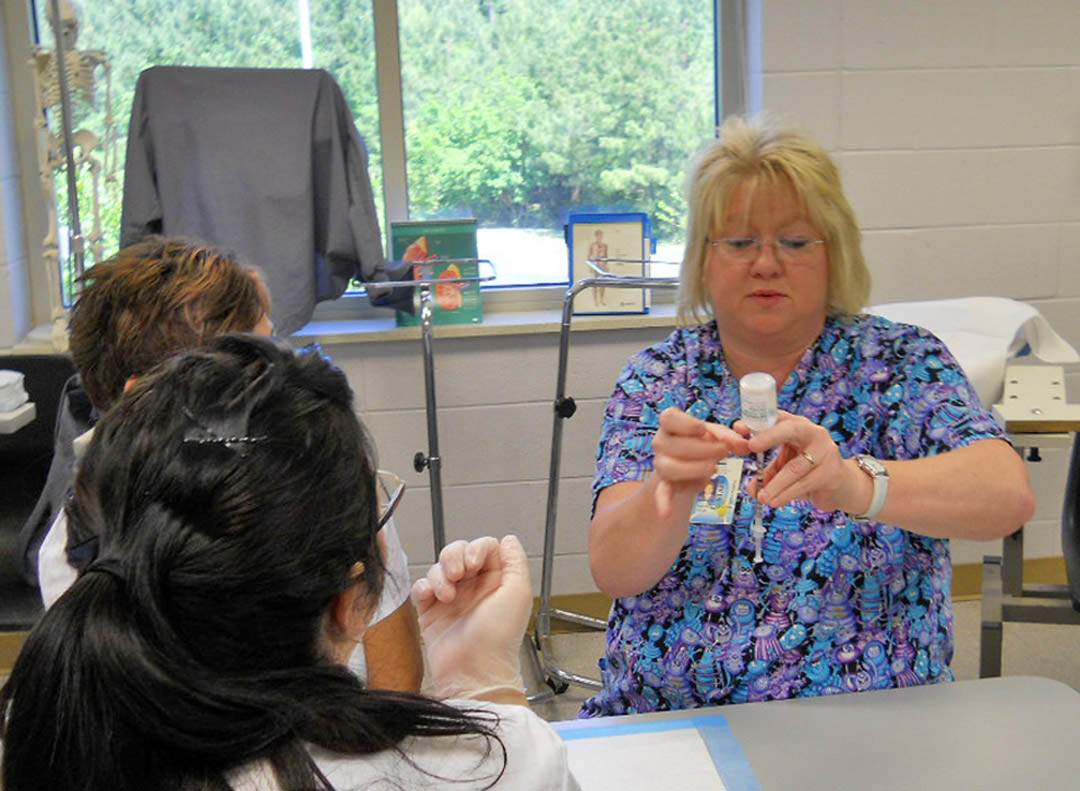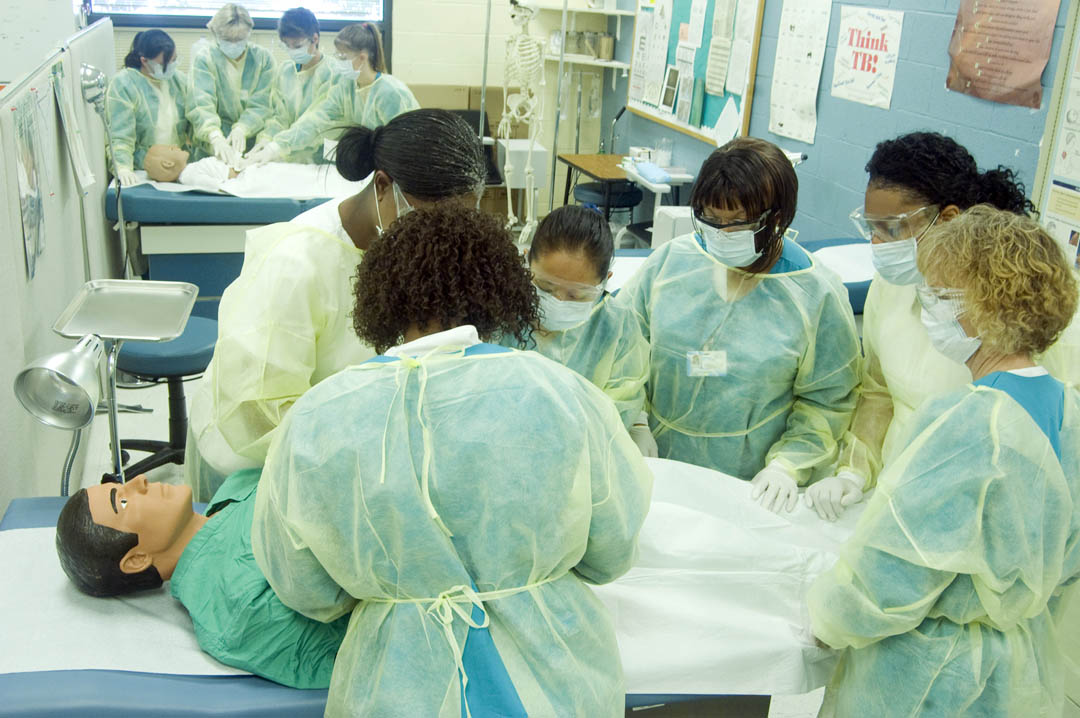College News
CCCC Medical Assisting grads in demand
Notice: This article is older than 12 months. Names, contact information, programs, titles, etc. might have changed. If you have any problems please call the main college number, 1-800-682-8353, and we will be happy to direct you accordingly.

click image to enlarge ⊗
Central Carolina Community College Medical Assisting instructor Joyce Thomas (right) demonstrates ... (more)

click image to enlarge ⊗
Central Carolina Community College's Medical Assisting students at the Harnett County Campus learn ... (more)
09.05.2012 • Curriculum Programs • Students/Graduates
SANFORD - A little bit of everything - that seems an apt description of what Central Carolina Community College Medical Assisting program graduates are qualified to do when they enter the workplace.
CCCC Medical Assisting lead instructor Melissa Fogarty said, "When students ask me what Medical Assistants do, I say we can do everything in the doctor's office except for be the doctor. We become the doctors' right-hand man. Anything they need and want us to do, we do."
Indeed, the duties of Medical Assistants (M.A.s) are many and multi-skilled and include clinical skills, lab procedures, and administrative office management duties.
"Medical Assistants offer a unique perspective on patient care and customer service and have the unique opportunity to exercise both their medical skills and business acumen," said Jon Matthews, dean of University Transfer, Health Sciences and Developmental Education at CCCC. "This type of cross-training and flexibility makes them a valuable element of the physician's practice."
Since M.A.s are trained in both clerical and clinical work, they are able not only to schedule appointments, process payments, and file insurance claims but also to administer shots, draw blood, test samples, and assist with procedures. In certain office settings, M.A.s can even be cross-trained in x-ray technology.
Other responsibilities of M.A.s include billing, collections, medical transcription, medical examinations, electrocardiology, administering medication, operating medical equipment, and discussing disease processes and pharmacology.
Fogarty noted that, "all that is done in the doctor's office is done under the direction and direct supervision of a physician."
Medical Assisting is one of the fastest growing fields in the country, and Medical Assisting graduates are in high demand. According to the Bureau of Labor Statistics for Occupational Employment published in May 2010, the demand for M.A.s is expected to increase by 30 percent through 2014.
Certified Medical Assistants are qualified for jobs as medical assistants as well as medical office assistants, clinical specialists, and insurance specialists, among others. Starting salaries for M.A.s range from $10-$19 an hour, depending on the area.
Of the sixteen CCCC M.A. graduates for 2012, fifteen already had jobs in place before graduation. The college's M.A. program boasts a 75 percent hire rate for graduates, both from jobs received from clinical externships and those obtained from application processes.
The CCCC M.A. program also boasts an impressive 100 percent pass rate of the Certified Medical Assisting exam offered by the American Association of Medical Assistants.
Fogarty said that she is "100 percent confident in the skills" of CCCC M.A. graduates.
"When I graduate students, I want to know these students are trained well enough to work on my mother, my children, and myself," she says.
Fogarty is herself a CCCC M.A. graduate--as are the other two M.A. instructors, Joyce Thomas on the Chatham campus and Anne Davis-Johnson on the Harnett campus.
Fogarty states that the M.A. program has a commitment to excellence, a commitment that all three instructors are pledged to, both professionally and personally.
"Anne, Joyce, and I are very passionate about Medical Assisting and very passionate about training good Medical Assistants because we do not want to put people out there who will tarnish our reputation, not just as instructors but as colleagues in a field of study," Fogarty explained.
She said that she, Davis-Johnson, and Thomas all chose Medical Assisting because it fit their lifestyles: "Medical Assisting gave us the opportunity to get trained, get a good job, and still be able to raise our own children."
Matthews said that Medical Assisting is one of a few allied health fields in which a graduate can expect to find employment that offers a family-friendly, daytime schedule.
"It's a win-win for our students and for the physicians who employ them," he said.
CCCC Medical Assisting classes follow a two-year track for an Associate of Applied Science and a one-year track for a diploma. The A.A.S. program is a five-semester plan of 71 total credit hours. The one-year diploma track consists of 46 credit hours and follows the same course schedule as the first year of the A.A.S. program.
Courses for the first year are offered seated on the Chatham and Harnett campuses. Second-year courses are offered online or hybrid at the Lee Campus.
Along with classroom coursework, a 240-hour clinical externship is required for A.A.S. students. The CCCC M.A. program has clinical externship affiliation agreements with medical facilities in Chatham, Cumberland, Harnett, Lee, Moore, and Wake counties.
During the externship, students gain experience working in local physician offices, including practices specializing in family care, pediatric, obstetric, orthopedic, urgent care, same-day surgery, or outpatient surgery.
Students interested in the M.A. curriculum must have a transferring or current GPA of 2.0, pass general placement tests, and meet with lead instructor Fogarty for an entry interview.
For more information about CCCC's associate degree in Medical Assisting, visit www.cccc.edu/curriculum/majors/medicalassisting/.
Categories
- Admin, Faculty & Staff Category
- Arts & Entertainment Category
- Clubs Category
- College & Community Category
- College General Category
- Continuing Education Category
- Curriculum Programs Category
- Distance Education Programs Category
- Facilities/Buildings Category
- Finances Category
- Foundation Category
- Graduations Category
- Lee Early College Category
- NCCCS Category
- SGA Category
- Special Events Category
- Sports Category
- Students/Graduates Category
- Uncategorized Category
Archives

